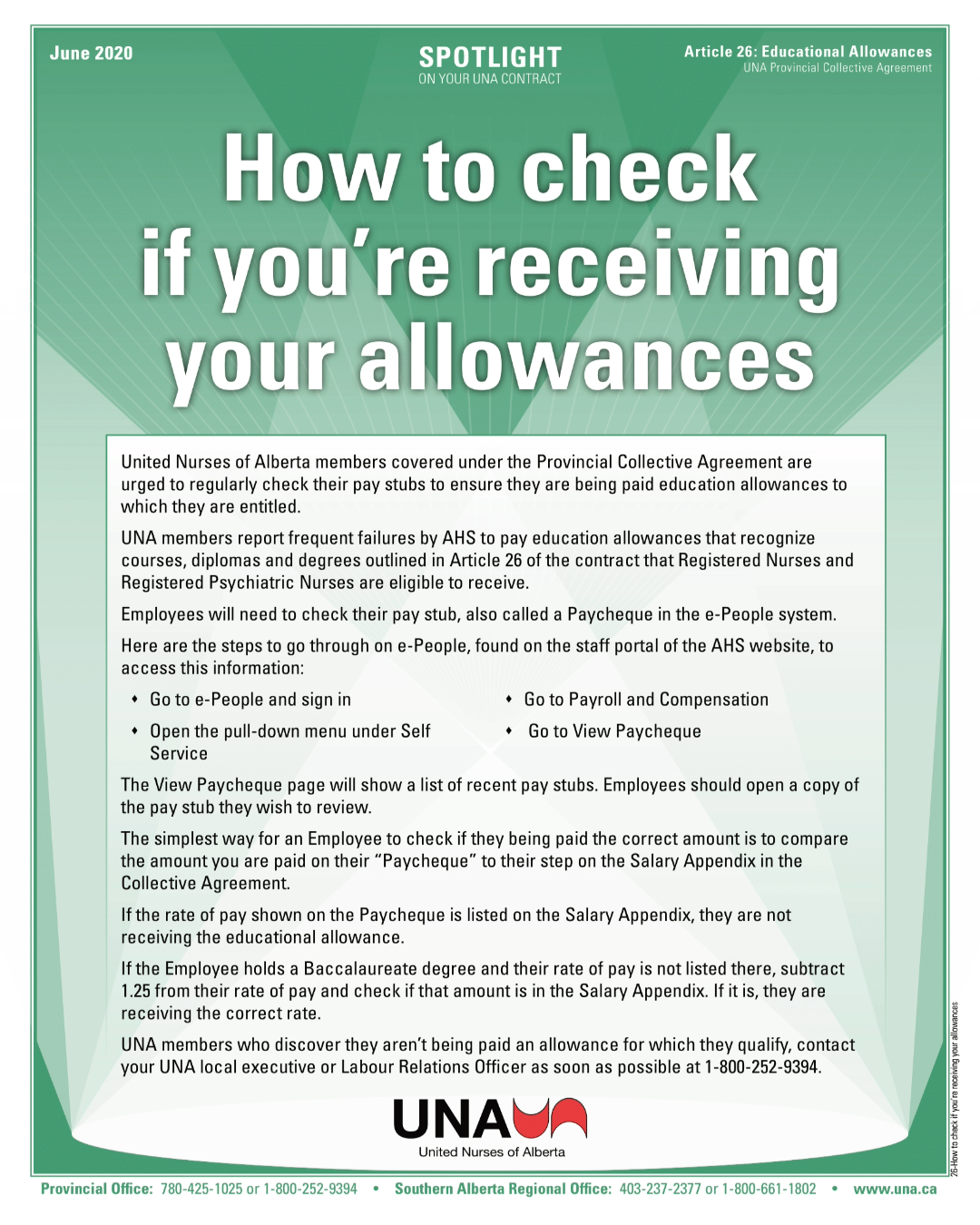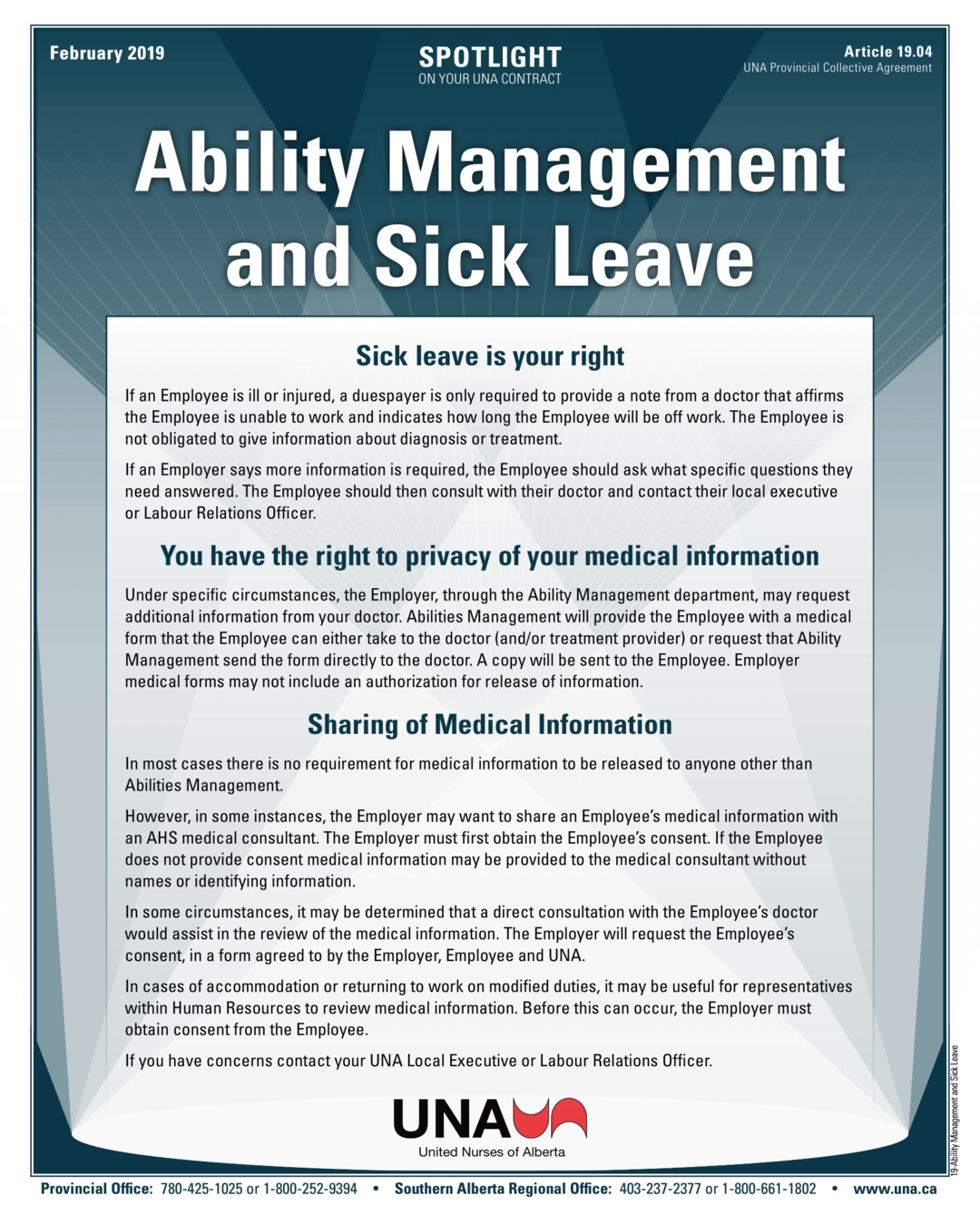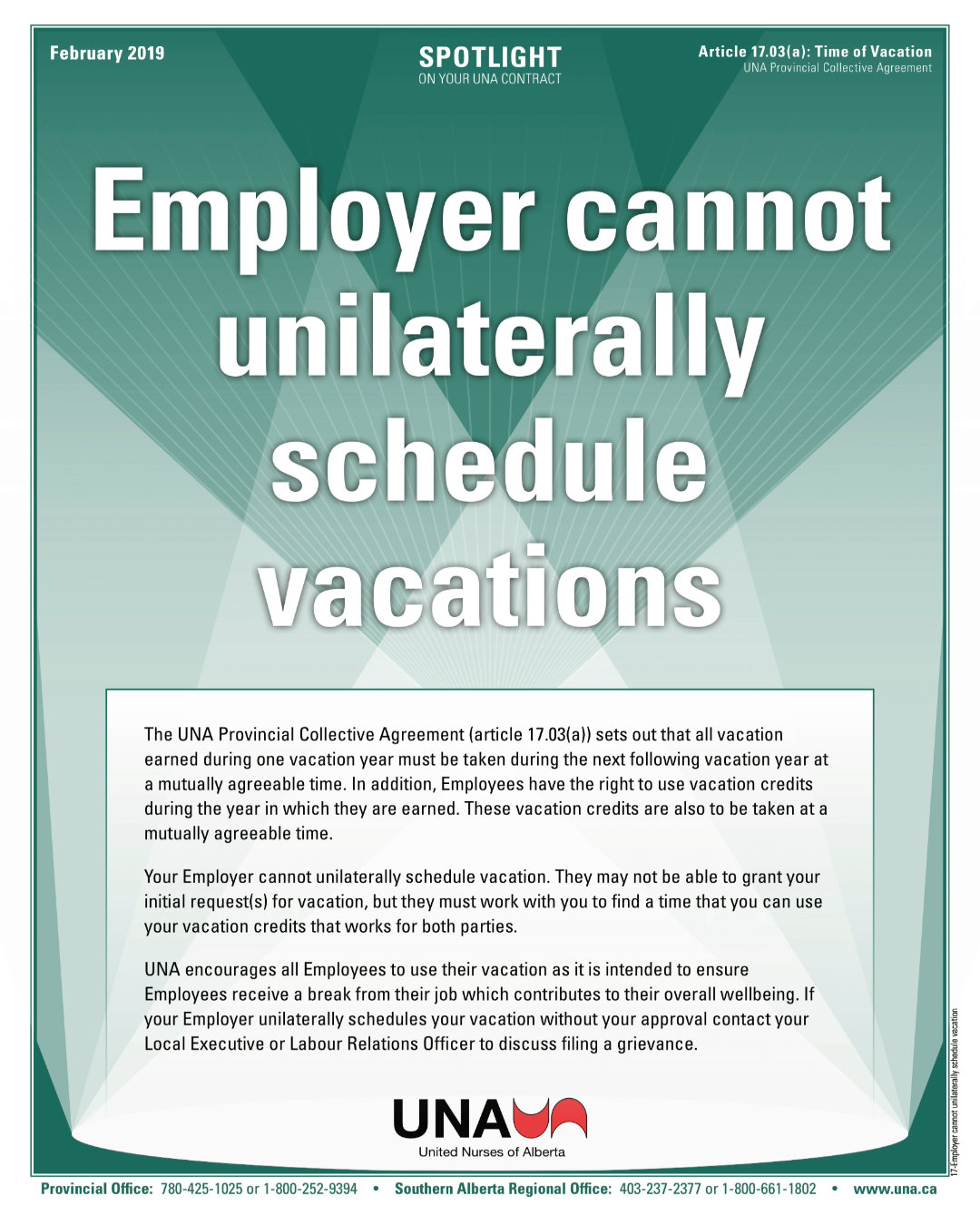The UNA Resources, Local Updates and Newsletter Blog
Stop trying to find information all over the web. Start below with a simple access to read the blog’s United Nurse of Alberta (UNA) resources, UNA Local 115 updates and our newsletter so you can be informed!
Catagories:
Local | Newsletters | UNA
Archive
- December 2024
- November 2024
- October 2024
- July 2024
- May 2024
- April 2024
- March 2024
- February 2024
- January 2024
- December 2023
- November 2023
- October 2023
- September 2023
- August 2023
- June 2023
- May 2023
- April 2023
- March 2023
- February 2023
- November 2022
- August 2022
- June 2022
- May 2022
- April 2022
- March 2022
- January 2022
- November 2021
- October 2021
- September 2021
- June 2021
- May 2021
- March 2021
- February 2021
- January 2021
- August 2020
- June 2020
- May 2020
- April 2020
- March 2020
- December 2019
- October 2019
- September 2019
- July 2019
- April 2019
- February 2019
- January 2019
- December 2018
- November 2018
- October 2018
- August 2018
- November 2017
- June 2017
- April 2017
- January 2017
- September 2016
- April 2016
- December 2015
- October 2015
- May 2015
- March 2015
- January 2015
- November 2014
- September 2014
- June 2014
- April 2014
- September 2013
- June 2013
- April 2013
- February 2013
- October 2012
- April 2012
- February 2012
- November 2011
- October 2011
- September 2011
- March 2011
- February 2011
- December 2010
- August 2010
- April 2010
- February 2010
- December 2009
- October 2009
- August 2009
- June 2009
- May 2009
- August 2008
- January 2008
- December 2007
- July 2007
- May 2007
- April 2007
- March 2007
- February 2007
- January 2007
- December 2006
- November 2006
- October 2006
- September 2006
- August 2006
- July 2006
- June 2006
- May 2006
- April 2006
- March 2006
- February 2006
- January 2006
- December 2005
- November 2005
- October 2005
- September 2005
- August 2005
- July 2005
- June 2005
- May 2005
- April 2005
- March 2005
- February 2005
- January 2005
- December 2004
- November 2004
- October 2004
- September 2004
- June 2004
- May 2004
- April 2004
- February 2004
- January 2004
- December 2003


Employees are not responsible for coverage once a shift exchange is approved
Employees are not responsible for coverage once a shift exchange is approved.
Employees are not responsible for coverage once a shift exchange is approved. According to Article 7.05 of the UNA Provincial Collective Agreement, employees are permitted to exchange shifts with one another. If two Employees agree to exchange shifts, then they can submit their request to their immediate supervisor in writing and the supervisor must indicate approval or disapproval in writing. “Pending” is not a valid response. Once the immediate supervisor approves a shift exchange, the respective Employees are no longer responsible for their pre-exchange shifts. It has no impact on the shift exchange, if someone transfers to another position, is absent due to illness or is otherwise unable to work that shift for any reason. If your manager refuses to approve a shift exchange or if they require you to work a preexchange shift, please contact your UNA local executive or Labour Relations Officer at 1-800-252-9394.






Employees have a right to refuse overtime – except in emergencies
Employees have a right to refuse overtime – except in emergencies
Under Article 8.04 of the UNA Provincial General Agreement, Employees have a right to refuse overtime – but not in an emergency, when the Employer can assign mandatory overtime. Members who are concerned that the Employer is using mandatory overtime improperly, or that they are being asked to work too much overtime, need to inform UNA as soon as possible so that an appropriate response can be made. Article 8:04 states: (a) The Employer shall endeavour to minimize the use of mandatory overtime. (b) The Employer may request an Employee to work a reasonable amount of overtime. Should the Employee believe that the Employer is requesting the Employee to work more than a reasonable amount of overtime, then the Employee may decline to work the additional overtime, except in an emergency, without being subject to disciplinary action. (c) An emergency is a circumstance that calls for immediate action. (d) The Employer shall take reasonable steps to avoid a staffing situation which may become an emergency prior to requiring overtime. Since “reasonable” is not defined in this article, it is up to Employees to use their own judgment determine if the Employer’s request in unreasonable. If you believe you are being asked to work an unreasonable amount of overtime, you should contact your Local executive or UNA Labour Relations Officer immediately. Can the employer ask you to work anyway? Yes, the Employer may use mandatory overtime in the event of an emergency. If you believe you have been asked to work mandatory overtime for something that is not a true emergency, or that the Employer has not taken reasonable steps to avoid a staffing situation that has resulted in an emergency, you should also contact your Local executive or UNA Labour Relations Officer immediately. You can contact your UNA Local Executive or Labour Relations Officer at 1-800-252-9394.



Ensure you are receiving your Education Allowances
Ensure you are receiving your Education Allowances
According to Article 26.01 of the United Nurses of Alberta Provincial Collective Agreement, Employers will acknowledge educational credentials from recognized post-secondary institutions and use those credentials to establish the Employee’s basic rate of pay. Check Article 26 of the Collective Agreement for a list of courses, diplomas and degrees eligible for an education allowance. An education allowance for a Baccalaureate Degree shall be payable after the Employee provides their Employer with satisfactory proof of their degree. Allowances for education shall be paid from the date the Employee provides proof of qualifications to the Employer retroactive to the date the Employee completed the requirements for the qualification or from the date of hire, whichever is later, to a maximum of 12 months. Unfortunately, however, experience shows that Employees are not always paid the allowances to which they are entitled even after they have informed the Employer. As a result, at the time they inform the employer of their entitlement to an education allowance, UNA members are encouraged to retain a date-stamped document or a copy of the email they sent to establish when and how they informed the employer. Education allowances are not cumulative. An Employee should expect to only receive the highest allowance for which they are eligible. UNA members with any questions of concerns should contact their UNA local executive or Labour Relations Officer at 1-800-252-9394.

How to check if you’re receiving your Education Allowances
How to check if you’re receiving your Education Allowances
United Nurses of Alberta members covered under the Provincial Collective Agreement are urged to regularly check their pay stubs to ensure they are being paid education allowances to which they are entitled. UNA members report frequent failures by AHS to pay education allowances that recognize courses, diplomas and degrees outlined in Article 26 of the contract that Registered Nurses and Registered Psychiatric Nurses are eligible to receive. Employees will need to check their pay stub, also called a Paycheque in the e-People system. Here are the steps to go through on e-People, found on the staff portal of the AHS website, to access this information: Go to e-People and sign in Open the pull-down menu under Self Service Go to Payroll and Compensation Go to View Paycheque The View Paycheque page will show a list of recent pay stubs. Employees should open a copy of the pay stub they wish to review. The simplest way for an Employee to check if they being paid the correct amount is to compare the amount you are paid on their “Paycheque” to their step on the Salary Appendix in the Collective Agreement. If the rate of pay shown on the Paycheque is listed on the Salary Appendix, they are not receiving the educational allowance. If the Employee holds a Baccalaureate degree and their rate of pay is not listed there, subtract 1.25 from their rate of pay and check if that amount is in the Salary Appendix. If it is, they are receiving the correct rate. UNA members who discover they aren’t being paid an allowance for which they qualify, contact your UNA local executive or Labour Relations Officer as soon as possible at 1-800-252-9394.



Part-time Employees have right to reschedule when a scheduled day falls on a named holiday
Part-time Employees have right to reschedule when a scheduled day falls on a named holiday
Part-time Employees have the right to request to reschedule a scheduled day that falls on a named holiday. Under Article 18.03 (c) of the current UNA Provincial Collective Agreement (which is amended in Article 30 of the Agreement) “where a part-time Employee is not scheduled to work on what would otherwise be a regular work day directly as a result of a Named Holiday, those hours may, at the request of the Employee, be rescheduled in the Cycle of the Shift Schedule.” This means an Employee may choose whether or not to make a request. If the Employee makes a request then the hours must be rescheduled in the Cycle of the Shift Schedule. This provision gives employees the option of adding an additional shift somewhere else during the impacted week and avoids a reduction in pay for that pay period. For those Employees who do not make a request to reschedule the shift, they receive an additional 5 per cent pay in lieu of the paid time off for a named holiday provided to a Fulltime Employee.

Employer must indicate denial of vacation requests in writing
Employer must indicate denial of vacation requests in writing
Article 17.03 of the UNA Provincial Collective Agreement states that all vacation earned during one vacation year shall be taken during the next following vacation year at a mutually agreeable time. At most UNA sites, the employer must inform the employee of approval or denial of their requests on the vacation planner by April 30. Under Article 17.03 (b) (ii) the Employer must indicate approval or denial of the vacation request in writing within 14 days of the request. In addition, it is management’s job to find a replacement. The vacation planner is intended to assist the Employer with that task. So Employees should not be required to find their own replacement in order to have their vacation approved. If there is a delay in the approval beyond the deadline, or if the employer says it is pending, the employee should consider their vacation denied and initiate a grievance immediately. Grievances should be filed within 10 days (excluding weekends and named holidays) of April 30 or from the day you were informed of vacation decisions, whichever is earlier. For more information, contact your UNA local executive or your UNA Labour Relations Advisor at 1-800-252-9394.

Casual Employees eligible for overtime when they work beyond their scheduled shift hours
Casual Employees eligible for overtime when they work beyond their scheduled shift hours
When Casual Employees are offered a shift, they should confirm the length of the shift they are being asked to work. This is important information as Casual Employees are eligible for overtime if they work beyond their scheduled shifts hours. However, Casual Employees must work a minimum of 7.75 hours to be eligible for overtime. If a Casual if replacing a regular Employee, any hours they work beyond what the regular Employee would have worked (7.75 hrs or an extended hour shift) is deemed to be overtime and paid at 2X the basic rate of pay. When a Casual is offered a shift that does not replace a regular Employee, they should confirm the number of hours they are booked to work. Any hours worked beyond the scheduled shift length and in excess of 7.75 hours should be paid at 2X the basic rate of pay. If a Casual Employee is scheduled to work a 4 hour shift and is asked to stay an addition 3.75 hours (total of 7.75 hours), they are not eligible for overtime. Make sure you claim overtime when it is appropriate. If your Employer denies your request for overtime, contact your Local Executive or Labour Relation Officer as soon as possible.

Ability Management and Sick Leave
Ability Management and Sick Leave
Sick leave is your right If an Employee is ill or injured, a duespayer is only required to provide a note from a doctor that affirms the Employee is unable to work and indicates how long the Employee will be off work. The Employee is not obligated to give information about diagnosis or treatment. If an Employer says more information is required, the Employee should ask what specific questions they need answered. The Employee should then consult with their doctor and contact their local executive or Labour Relations Officer. You have the right to privacy of your medical information Under specific circumstances, the Employer, through the Ability Management department, may request additional information from your doctor. Abilities Management will provide the Employee with a medical form that the Employee can either take to the doctor (and/or treatment provider) or request that Ability Management send the form directly to the doctor. A copy will be sent to the Employee. Employer medical forms may not include an authorization for release of information. Sharing of Medical Information In most cases there is no requirement for medical information to be released to anyone other than Abilities Management. However, in some instances, the Employer may want to share an Employee’s medical information with an AHS medical consultant. The Employer must first obtain the Employee’s consent. If the Employee does not provide consent medical information may be provided to the medical consultant without names or identifying information. In some circumstances, it may be determined that a direct consultation with the Employee’s doctor would assist in the review of the medical information. The Employer will request the Employee’s consent, in a form agreed to by the Employer, Employee and UNA. In cases of accommodation or returning to work on modified duties, it may be useful for representatives within Human Resources to review medical information. Before this can occur, the Employer must obtain consent from the Employee. If you have concerns contact your UNA Local Executive or Labour Relations Officer.

Employer cannot unilaterally schedule vacations
Employer cannot unilaterally schedule vacations
The UNA Provincial Collective Agreement (article 17.03(a)) sets out that all vacation earned during one vacation year must be taken during the next following vacation year at a mutually agreeable time. In addition, Employees have the right to use vacation credits during the year in which they are earned. These vacation credits are also to be taken at a mutually agreeable time. Your Employer cannot unilaterally schedule vacation. They may not be able to grant your initial request(s) for vacation, but they must work with you to find a time that you can use your vacation credits that works for both parties. UNA encourages all Employees to use their vacation as it is intended to ensure Employees receive a break from their job which contributes to their overall wellbeing. If your Employer unilaterally schedules your vacation without your approval contact your Local Executive or Labour Relations Officer to discuss filing a grievance.

Casual Employees eligible for overtime when they work in excess 147.25 hours in a four week period
Casual Employees eligible for overtime when they work in excess 147.25 hours in a four-week period
